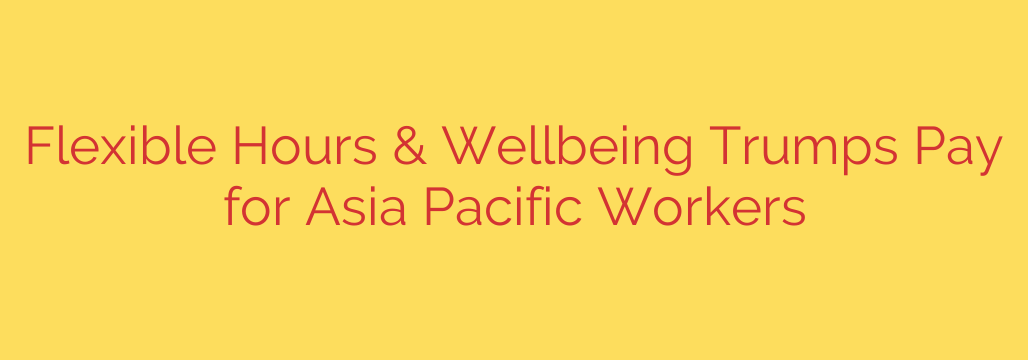
Beyond the Paycheck: Why Flexibility and Wellbeing Now Define the APAC Workplace
The old rules of employee engagement are being rewritten across the Asia-Pacific region. For decades, a competitive salary was the ultimate prize in the war for talent. Today, a seismic shift in employee expectations is forcing businesses to rethink their entire value proposition. The new currency of loyalty isn’t just about money—it’s about flexibility, balance, and genuine wellbeing.
A growing body of evidence reveals that for a majority of workers in the APAC region, the benefits of a supportive and flexible work environment now outweigh the allure of a higher paycheck alone. This change, accelerated by the global events of the past few years, signifies a permanent evolution in what professionals demand from their employers.
The New Employee Priorities: What Talent Really Wants
Companies that fail to recognize this fundamental shift risk falling behind in the race to attract and retain top performers. To build a thriving and resilient workforce, leaders must understand the key drivers motivating today’s employees.
Work-Life Balance is Paramount: The single most desired attribute of a job is no longer the salary, but the ability to maintain a healthy work-life balance. Employees are actively seeking roles that allow them to integrate their professional responsibilities with their personal lives without sacrificing their mental or physical health.
Flexibility is a Non-Negotiable: The demand for flexible work arrangements has solidified its place as a top priority. This includes not only the location of work (hybrid or remote options) but also flexibility in working hours. Professionals want autonomy and trust, empowering them to work when and where they are most productive.
Comprehensive Wellbeing Support is Essential: Employee wellbeing has moved from a “nice-to-have” perk to a core business necessity. This extends far beyond a simple wellness app or gym membership. Top talent is looking for robust support systems that address mental, physical, and financial health. This includes access to confidential counseling services, stress management resources, and financial literacy programs.
The Cost of Inaction: Why Companies Must Adapt
Ignoring this evolution in employee sentiment is a costly mistake. Businesses clinging to outdated, rigid work models will face significant challenges, including:
- Increased Employee Turnover: Talented professionals will not hesitate to leave a company that disregards their need for balance and wellbeing, even if it means taking a pay cut for a more supportive environment.
- Difficulty in Talent Acquisition: Your company’s reputation is a critical recruitment tool. A culture known for burnout and inflexibility will actively deter the best candidates, who now have more options than ever.
- Decreased Productivity and Engagement: Overworked and unsupported employees are far more likely to become disengaged, leading to lower morale, reduced innovation, and a negative impact on the bottom line.
Actionable Steps for Building a Modern Workplace
To stay competitive, organizations must proactively adapt their culture and policies. The focus should be on creating an environment where employees feel valued as whole individuals, not just as workers.
Listen to Your People: Don’t assume you know what your employees need. Conduct regular, anonymous surveys to gather honest feedback on work-life balance, management support, and desired benefits. Use this data to inform your strategy.
Redesign Your Benefits Package: Move beyond traditional compensation. Evaluate and enhance your offerings to include comprehensive mental health coverage, flexible leave policies, and resources that support employee wellbeing in a holistic way.
Empower Your Managers: Middle managers are the frontline of company culture. Train them to lead with empathy, recognize signs of burnout, and champion flexible work practices. Give them the tools and autonomy to support their teams effectively.
Embrace a Culture of Trust: True flexibility is built on a foundation of trust, not surveillance. Focus on outcomes and results rather than hours spent at a desk. This approach fosters a sense of ownership and respect that is crucial for retaining top talent.
The future of work in the Asia-Pacific region is clear. While compensation will always be an important factor, it is no longer the deciding one. The organizations that will win the war for talent are those that build a human-centric culture—prioritizing the flexibility, balance, and overall wellbeing of their most valuable asset: their people.
Source: https://datacenternews.asia/story/asia-pacific-workers-seek-flexible-hours-wellbeing-over-pay








